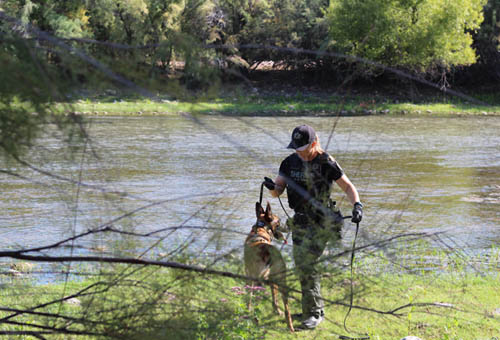


Examine the importance of multidisciplinary team (MDT) case coordination and evidence corroboration in the investigation of child abuse cases. Various members of the Multidisciplinary Team, such as law enforcement, child protective services, and forensic interviewers may gather different or differing information. Learn how to evaluate evidentiary findings through crime scene images, interviews and case studies. Understand multidisciplinary team members' roles and responsibilities for protecting child victims and prosecuting offenders. Focus on offenders’ use of technology, including the use of child sexual abuse material (CSAM) in grooming and manipulation. Discuss a variety of technology that can be used by investigators.

Avoid potential conflict both professionally and personally by learning to organize your thinking and respond calmly. Consider the approaches you can take to prevent and respond to verbal conflict. This course will explore the communication process, conflict prevention, to help you understand why conflicts occur. Instruction will also cover certain circumstances in which verbal de-escalation techniques may not be appropriate, and provide techniques to resolve such conflicts. Join us to learn how de-escalation techniques and communication skills can potentially defuse tense situations and lead to more successful outcomes. This training does not cover physical intervention techniques.

Part One of the Missing Children Investigation Series focuses on the vital role digital evidence plays in these high-stakes cases. In this webinar, learn how to analyze digital clues and utilize platform-specific open-source and OSINT tools to generate actionable leads quickly, because in missing children investigations, every minute counts. Gain the skills to effectively gather and request digital evidence while adhering to legal and procedural standards, including executing exigent, emergency disclosure, and preservation requests to ensure no critical evidence is lost in the search for a child.

SORN programs typically experience significant challenges related to staff turnover, inadequate resources, court challenges, and lack of skill development opportunities. Whether you are new to this area of work or are experienced, join us for an intensive two-day skill development training designed specifically for SORN personnel. During the training, we will cover an introduction and overview of SORN laws, registration of offenders, community notification to the public, and enforcement and compliance issues. Advanced skill development such as registrant monitoring and compliance, and community notification meetings will also be covered. Participate in this interactive training which includes educational information, ready-to-use resources, case studies, interactive discussion, and opportunities to apply learned skills.

Seconds count when a child is missing. Gain the critical skills needed to construct and manage effective search and canvass operations to recover the child. Recognize crucial cell phone and technology-related evidence which can help locate the child and track the abductor. Explore relevant legal issues associated with criminal cases against those who abduct and harm children. Participate in hands-on exercises designed to test your knowledge and application of the material and prepare you for your next missing child case.

Test your community’s response in conducting an initial investigation, search and canvass activities for a missing or abducted child scenario occurring on tribal lands. Employ strategies and responses in mitigating and resolving the emergency. Participate in a multi-disciplinary, multi-jurisdictional tabletop exercise, to build cohesiveness with tribal, state, local and federal partners when responding to an emergency.

Gather up-to-date information for the investigation and prosecution of all types of child abuse cases utilizing a multidisciplinary team (MDT) approach. Learn about medical evidence, interviewing child victims/witnesses and adult suspects/witnesses, along with legal issues involved in the investigation and prosecution of child physical and sexual abuse cases. Discuss trends in offenders’ use of technology, the use of child sexual abuse material (CSAM), and sextortion. Learn law enforcement investigative techniques that capitalize on new technology.

Child sex trafficking (CST) is like no other crime. Victimization may happen hundreds of times and can be difficult to identify due to the victims being missing children coupled with the trafficker’s hold on victims. Dissect the crime of CST, its complex nature, and discover how to investigate this crime fully. Develop trauma-informed approaches to ensure your victim interview does not retraumatize and you gain critical information to identify corroborative evidence. Examine the trafficker’s profile and motivation, how they impact your suspect interview, and proven suspect interview strategies. Recognize common evidence available, legal hurdles, and common defenses of traffickers.

The opioid crisis and the flood of other drugs has reached epidemic proportion in many of our communities. Join us to learn more about this national challenge and other emerging drug trends such as fentanyl, heroin, cocaine, methamphetamines, synthetic cannabinoids, and other chemicals. Explore the issues associated with the legalization of marijuana in many states and vaping, butane hash oil, and cannabis edibles. Gain an understanding of the stages of use, addiction, withdrawal symptoms, and the health and life-threatening dangers posed from the use of drugs. Discuss common delivery systems and observe examples of emerging drugs in various forms. Learn how to recognize the signs and symptoms of drug usage, as well as how Naloxone/Narcan works in cases of opioid overdoses.

Learn how to objectively investigate child death cases, particularly when the cause and manner of death is unexplained. Examine investigative mindset from initial call-out to case resolution and learn how to gain an understanding of what happens with a victim-centered approach, exploring the emotional trauma of the non-offending caregiver. Discuss possible causes of death and best practices and tips including various investigative steps for evidence collection, witness and suspect interviews. This basic course offers law enforcement, CPS, and other child death investigators up-to-date practices for the investigation of child deaths.
